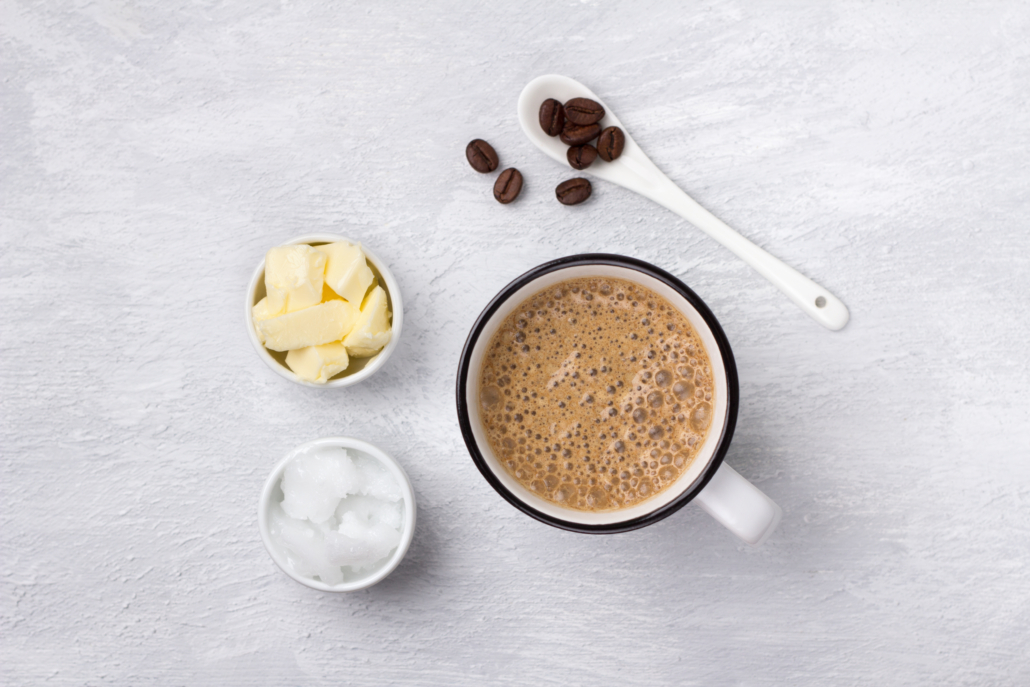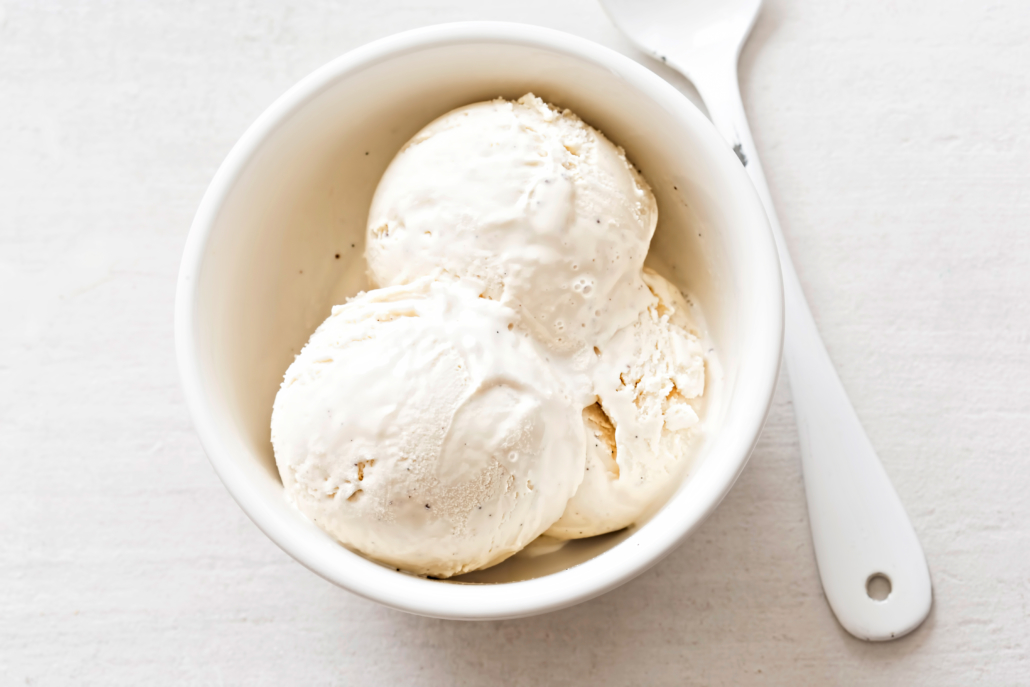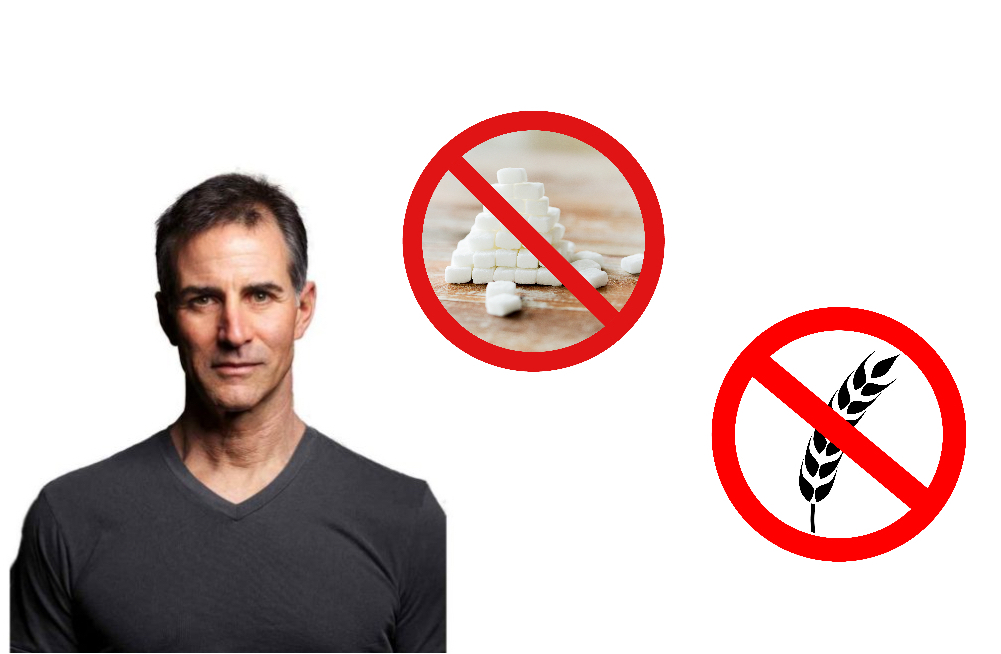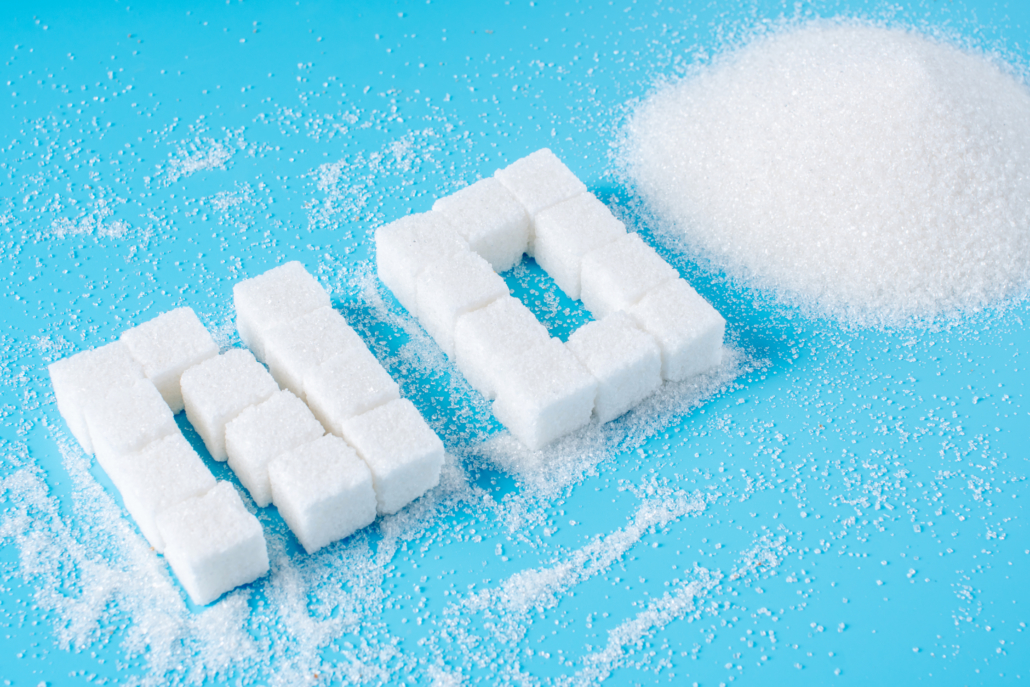We include products in articles we think are useful for our readers. If you buy products or services through links on our website, we may earn a small commission.
The Ultimate Vegan Keto Diet Guide
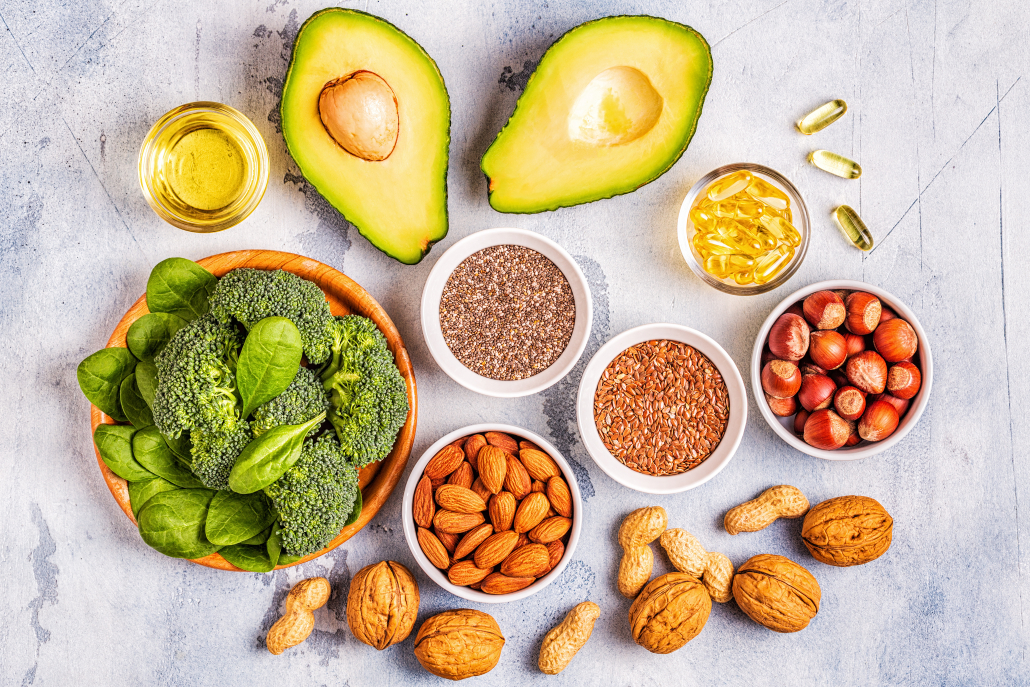
We created this guide to the vegan keto diet because we believe everyone should have the resources they need to reap the health benefits of a high-fat low-carb lifestyle.
Many vegans wonder if it’s possible to go keto while maintaining their vegan lifestyles. We’re here to tell you that with some planning and reliable guidelines, the answer is yes! You can remain vegan and go keto.
Table of Contents
- What Is a Vegan Diet?
- What Is a Vegan Keto Diet?
- Why is Fat the Perfect Fuel for Vegans?
- Research on Vegan Keto Diets
- 5-Step Plan for Starting Your Vegan Keto Diet
- Vegan Keto Veggies
- Vegan Keto Fruits
- Foods to Avoid on a Vegan Keto Diet
- Vegan Keto Meal Plan
- Vegan Keto Diet Side Effects
- Vega Keto: The Outlook
What Is a Vegan Diet?
A vegan diet eliminates all animal-sourced foods and products and strictly adheres to “plant-based foods” centered on fruits, vegetables, nuts, seeds, legumes, and grains.
This makes it the strictest form of a vegetarian diet. Vegans not only eliminate meat and fish, they also steer clear of eggs, cheese, milk, honey, and gelatin.
This doesn’t mean that vegans eat only fresh and whole foods. Vegan foods can still be processed and contain a long list of ingredients. For example, white bread, pasta, many baked and fried foods like donuts, along with candy can all be vegan.
Of course, we recommend a balanced, vegan keto diet that consists mainly of whole, unprocessed foods.
Reasons for Going Vegan
For vegans, keto can feel intimidating and inaccessible because many people who chose to be vegans often do so for two mains reasons:
- You’ve been told that animal fats–and dietary fats in general–are harmful and should be avoided.
- You have ethical values and environmental concerns around raising and eating animals and animal based products.
Reasons for Going Keto
Some of the most common reasons people chose a keto lifestyle include:
- The proven metabolic and neurological benefits of a high-fat low-carb diet.
- An anthropological perspective that sees humans as primarily meat eaters, metabolically optimized for consuming quality animal fats, proteins, vitamins, and minerals.
Can Vegans Go Keto?
On the surface, the distance between, “ketotarians” and vegans might seem unbridgeable. But where they often meet is in a shared desire to cut out toxic processed foods, while taking control of their health through intentional eating.
If you’re a vegan and you’re all-in for the benefits of fat, vegan keto is possible, healthy, and sustainable.
What Is a Vegan Keto Diet?
A vegan keto diet is a high-fat, low-carbohydrate, and moderate-protein diet based only on plant foods. A vegan keto nutrient plan consists roughly of:
- 70-80% of calories from fat
- 15-30% calories from protein
- 5% calories from carbohydrates
What Does “Keto” Mean?
The keto diet gets its name from the metabolic state called nutritional ketosis that your body enters when you either fast or eliminate most carbohydrates for three to four days. [1]
What is Ketosis?
When eating a high-carb Standard American Diet, your body breaks down carbohydrates into glucose for energy.
When your carb intake drops below 30 grams per day, your glucose stores get depleted. Blood sugar and insulin levels fall and energy in the form of fatty acids from stored body fat and the fat you eat, begin to enter your bloodstream and accumulate.
Over time, the level of fatty acids in the blood rises to a point at which specific enzymes in the liver convert some of this fat into molecules called ketone bodies. [2] This process is called ketogenesis. When ketogenesis is providing the primary fuel source, you are in ketosis. [3]
Why is Fat the Perfect Fuel for Vegans?
Eating fat is essential. In the world of nutrition “essential” means that your body can’t synthesize it, so you have to get it from your diet. Fortunately, essential dietary fats are found in both the animal and plant kingdoms.
Making fat your main source of energy provides benefits including:
- Improved blood lipid levels. [4]
- Improved insulin sensitivity. [5]
- More satiating meals, reducing cravings for processed and high-carb foods. [6]
- Regulation of inflammation and increased immunity. [7]
- The ability to absorb fat-soluble vitamins (K, D, E, etc). [8]
- Maintain healthy skin, hair, and nails.
Following a high-fat low-carb diet has also been shown to reduce your risk of metabolic syndrome and type II diabetes. What’s more, a ketogenic diet also has therapeutic benefits for diseases such as cancer, polycystic ovary syndrome (PCOS), cardiovascular diseases, and neurological diseases. [9]
Obesity is a risk factor for many chronic diseases. Remarkably, following a keto diet can reduce body weight by reducing appetite, increasing leptin sensitivity, and improving fat metabolism. [10] [11]
Research on Vegan Keto Diets
If practiced correctly a vegan keto diet can offer similar benefits to a traditional keto diet.
However, no studies exist looking specifically at vegan keto diets.
There has been one study looking at overweight participants on a low-carb (Eco-Atkins) vegan diet. In this study 47 participants who were overweight with high cholesterol where randomly assigned either a high-carb vegetarian diet that included eggs and dairy, or a lower-carb vegan diet.
In the first phase of the study, calories were restricted for both groups, weight loss was similar, and the low-carb vegan group had more positive reductions in markers for cardiovascular diseases.
For the second phase, each group was permitted to eat as much of their specific foods as they wanted. The vegan group kept to the lower-carb ratio.
After six months, the lower-carb vegan raised HDL (good) cholesterol, and lowered their LDL (bad) cholesterol and triglycerides, and lost an average of 8-9 pounds–slightly more weight than the high-carb vegetarian group. [12]
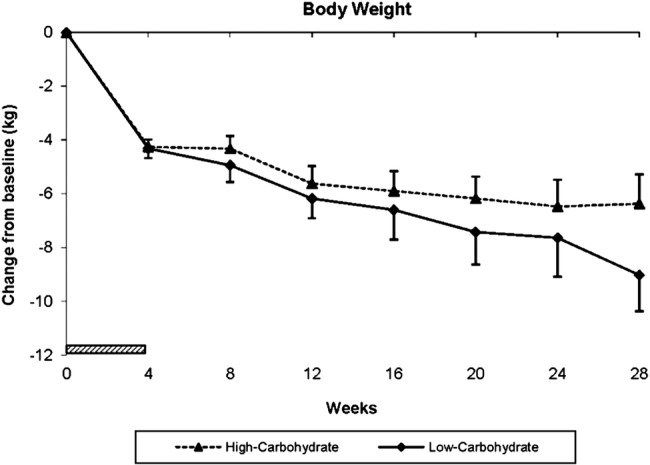
Image from ncbi.nlm.nih.gov
It’s important to note that the “lower-carb” vegan diet still allowed for a daily intake of around 100 grams of net carbs in the first phase, and 140 grams in the second phase. Both amounts would not allow most people to enter ketosis. We believe that the positive results would have been even more significant if the low-carb diet was truly keto.
5-Step Plan for Starting Your Vegan Keto Diet
A well-planned vegan keto diet based on whole, unprocessed foods can provide most, but not all macronutrient and micronutrient needs. [13] This 5-step plan will help you lay a healthy macronutrient foundation. To bridge the nutrient gap, some supplements may be necessary–a point we’ll discuss a little later.
Step 1: Track Your Macronutrients
The first step to start your vegan keto diet is to calculate your macronutrients. You can use this keto calculator to determine how much you should eat. It will take your gender, height, weight, and activity level into consideration and create a personalized breakdown of fats, carbs, and protein.
You don’t want to skip this step because it’s important to know how much you need to eat to sustain your body and activity level. Without eating the correct amount of macronutrients, especially fat, you can prevent your body from entering ketosis.
Step 2: Cut Out High-Carb Foods
While on a vegan keto diet, you need to limit your carb intake to 20 to 50 grams per day. You can start by eating around 50 grams per day and slowly lower your intake to 20 grams as you feel more comfortable.
High-carb foods that you should limit on a vegan keto diet include:
- Wheat
- Rice
- Quinoa
- Rolled oats
- Starchy vegetables
- Potatoes
- Peas
- Beans
- Fruits (except for berries)
For many vegans, it can come as a surprise that staples like rolled oats and beans contain more than 60 grams of carbs per 100 grams serving size. These are foods that were often relied on for protein and can be difficult to let go of.
To help with the transition to keto, try these low-carb alternatives:
- Cauliflower rice
- Zucchini noodles
- Chia seed pudding
- Almond flour crackers
- Low-starch vegetables
- Broccoli
- Bell peppers
- Brussel sprouts
- Spinach
- Arugula
- Berries
- Raspberries
- Blueberries
- Strawberries
- Blackberries
Remarkably, 100 grams of cauliflower rice contains 5 grams of carbs compared to the 28 grams of carbs of regular white rice.
Step 3: Eat Healthy Fats
Eating enough fat is often the most challenging part of a vegan keto diet. But it’s also the most important. When going keto, your body will rely on fat accounting for between 70% and 80% of your calories.
And because fat is your primary caloric intake and fuel source, choosing the right types of fat is crucial. The following fats make a great vegan keto foundation.
Avocados
Loaded with healthy fats, Avocados also offer a decent rundown of essential vitamins and minerals. A single avocado provides 30% of your daily potassium intake–a hard-to-get mineral on a keto diet. Avocados have also been shown to balance blood sugar, support healthy aging, and improve heart health. [14] [15]
Coconut Oil
Popular across all keto diets, coconut oil is a natural source of medium-chain triglycerides (MCTs). MCTs are easily absorbed and turned into energy, and many people use MCT’s to help with the transition into ketosis. [16]
Olives and Cold Pressed Olive Oil
Olives and olive oil have been a healthy fat-filled staple for millenia. Olives contain hard-to-get vitamin E, along with compounds that reduce inflammation and associated diseases including heart disease, osteoporosis, and cancer. [17] [18]
A note when cooking with oils: Though fairly heat stable when compared to other vegetable oils, olive oil contains 11% polyunsaturated fatty acids (PUFAs). When exposed to heat PUFAS form toxic compounds, including lipid peroxides and aldehydes that can contribute to cancer. [19] So we recommend heating olive oil as little as possible, while cutting out all other high PUFA oils.
Other healthy fats that you can enjoy on a vegan keto diet include:
- Chia seeds
- Flax seeds
- Walnuts
- Full-fat coconut milk
- Almonds
- Almond butter
- Almond flour
- Cashew cheese
- Vegan butter
However, we recommend limiting most nuts to small amounts since they can contain high levels of plant toxins and antinutrients, especially oxalate which contribute to numerous health issues.
Step 4: Add High-Quality Protein
Though animal foods are the only foods that contain all nine essential amino acids, non-meat sources can provide most of your needs.
Since our bodies and activity levels vary, we recommend around 1.2 to 2.0 grams of protein per KG of body weight. This averages out to about 70 grams of protein per day and accounts for around 25% of your total calorie intake.
Beans
| Type of Food | Quantity | Protein | Net Carbs |
|---|---|---|---|
| Lupini beans | 166 | 25 | 11 |
| Canned black soybeans | 200 | 20 | 2 |
| Tempeh | 100 | 18-20 | 4-7 |
| Nattō | 100 | 18-20 | 9-12 |
| Edamame beans | 155 | 17 | 5-7 |
| Tofu (extra firm) | 120 | 12-15 | 3 |
Nuts and Seeds
| Type of Food | Quantity | Protein | Net Carbs |
| Tahini | 60 grams | 10 | 8 |
| Hemp seeds | 80 grams | 25 | 4 |
| Sacha inchi seeds | 56 grams | 18 | 1 |
| Peanuts | 72 | 16 | 8 |
| Almond butter | 64 | 15 | 7 |
| Almonds | 64 | 15 | 6 |
| Sunflower seed butter | 14 | 4 | 4 |
Step 5: Supplement Your Vegan Keto Diet
Since practicing vegan keto restricts many foods, we’ve compiled these food lists to help you find the best sources of specific vitamins and minerals.
However, for many people, it will still be important to supplement. These recommendations are informed by looking at deficiencies common to all vegan diets, not just keto.
Vitamin D
Vitamin D is mostly found in animal products, but a good plant-based option is mushrooms grown under UV lights. You can also increase vitamin D through sun exposure. If you live in a dark climate or don’t spend enough time outside, it’s best to supplement with vitamin D. [20]
| Mushroom, RAW, exposed to UV light: ½ cup | 9.2 MCG vitamin D | 46% RDA |
Vitamin B2 (Riboflavin)
Though present in abundance in animal products, vitamin B is also found in plants but to a lesser extent. Unfortunately, plant sources of vitamin B2 are harder for your body to absorb, which can lead to low levels in vegans, so may be important to supplement.
Decent sources of vitamin B2 in a vegan keto diet include:
- Almonds
- Walnuts
- Flax seeds
- Hemp seeds
- Pumpkin seeds
- Kale
- Broccoli [21]
Calcium
Vegan keto foods that are high in calcium include:
- Kale
- Arugula
- Broccoli
- Tofu
- Almonds
- Macadamia nuts
- Pumpkin seeds
- Unsweetened almond milk
- Fortified mineral waters [22]
Iron
Iron is present in both animal and plant foods. However, your body doesn’t absorb the iron in plant foods as well. Plant-based foods like nuts and seeds contain the antinutrient phytic acid, which reduces the absorption of iron.
Eating a vegan diet increases your risk of iron deficiency. But if you eat a balanced and varied diet, you can most likely avoid any complications.
Good sources of iron in a vegan keto diet include:
- Almonds
- Unsweetened almond milk
- Macadamia nuts
- Spinach
- Raspberries
- Olives
Iodine
Fruits and vegetables are usually poor sources of iodine. You can increase your iodine intake in a vegan keto diet by consuming iodized salt. But you may want to consider an iodine supplement as well. [24]
Zinc
Like iron, the phytic acid in plant-based foods also reduces the absorption of zinc, so supplementation may be necessary. Vegan keto foods that are high in zinc include:
- Almonds
- Macadamia nuts
- Pumpkin seeds
- Hemp seeds
You can improve the bioavailability of zinc by germinating nuts and seeds, which decreases the levels of phytic acid.
Selenium
Selenium is another mineral that often goes undersupplied in a vegan diet. You can improve your selenium intake by eating the following foods:
- Broccoli
- White cabbage
- Garlic
- Mushrooms
- Asparagus
Vitamin B12
Plant-based foods don’t contain significant levels of vitamin B12. But you can obtain adequate vitamin B12 by eating fortified foods such as nutritional yeast, unsweetened almond milk, and tofu. Vitamin B12 supplements are also a good option in a vegan keto diet. [26]
Vegan Keto Veggies
A vegan keto diet will obviously be packed with plant foods. When it comes to veggies, a good rule of thumb to keep you in the green zone with carbs is to choose above ground vegetables, while avoiding root vegetables.
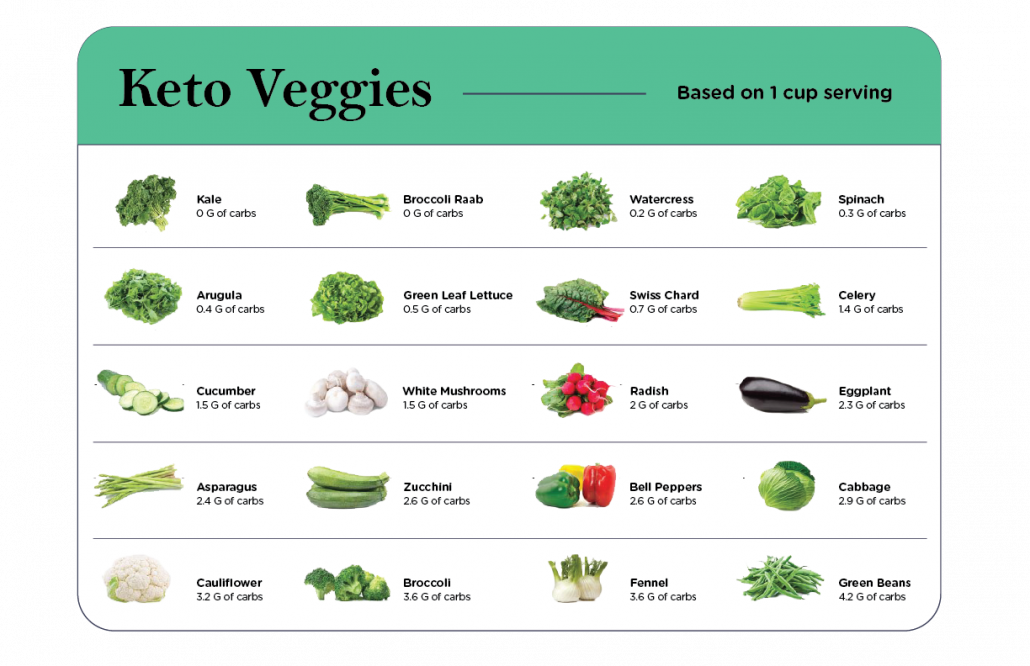
Vegan Keto Fruits
Fruits are nature’s candy. They’re sweet and full of sugar, which means they occupy a very small place in any keto diet. This list will help you steer clear of the fruits that will kick you out of keto. Click here for more insights into the benefits and downsides of fruit.
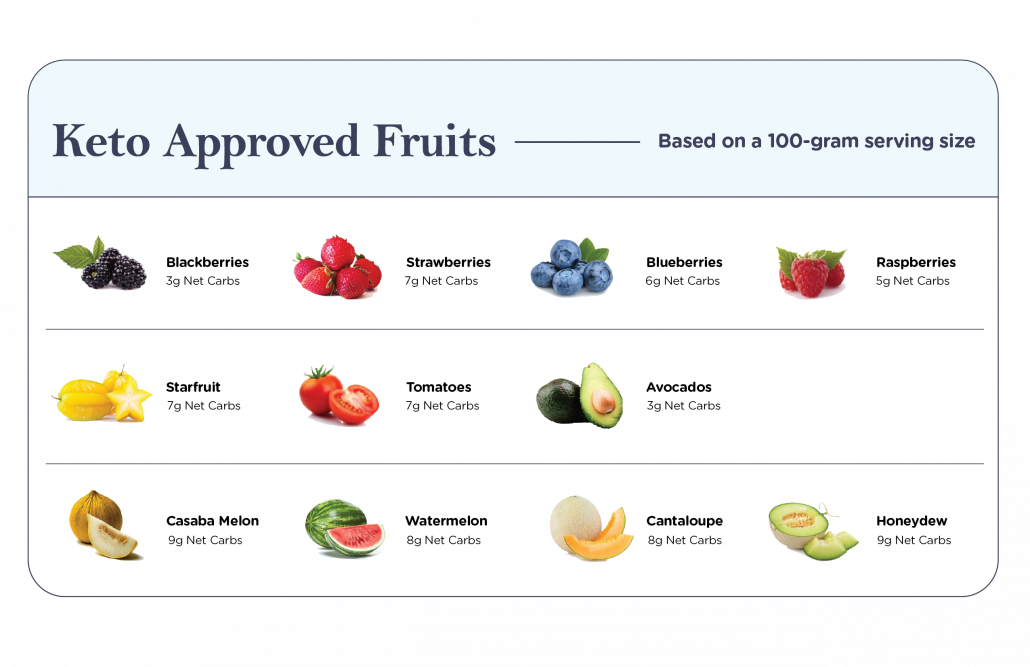
Foods to Avoid on a Vegan Keto Diet
You should avoid animal products on a vegan keto diet. This includes the following foods:
- Meat: beef, pork, lamb, beef stock, gelatin
- Poultry: chicken, turkey, chicken stock
- Dairy: milk, butter, yogurt, whey protein
- Eggs
- Seafood: fish, shrimp, clams, mussels
- Honey
You should also limit your intake of carbs and sugary foods including:
- Grains
- Soda
- Juice
- Agave
- Maple syrup
- Starchy vegetables
- Beans
- Fruit
- Beer
- Wine
- Processed foods
Vegan Keto Meal Plan
A balanced vegan keto meal plan includes proper macronutrient proportions, adequate micronutrient intake, and a healthy selection of fat sources.
Below, we’ve outlined a weekly meal plan that provides you with a variety of nutrient-dense foods that kickstart your vegan keto journey.
Monday
Breakfast: Chia seed pudding with raspberries and walnuts
Lunch: Tofu tacos on low-carb wraps
Dinner: Zucchini noodles with avocado sauce
Snack: Celery with almond butter
Tuesday
Breakfast: Tofu scramble with olive oil and mushrooms
Lunch: Kale salad with blueberries and hemp seed pesto
Dinner: Vegan cauliflower mac and cheese
Snack: Guacamole with almond flour crackers
Wednesday
Breakfast: Smoothie with full-fat coconut milk and low-carb vegan protein powder
Lunch: Arugula salad with almonds, tomatoes, and tempeh
Dinner: Zucchini noodles with nutritional yeast, olives, and vegan cheese
Snack: Avocado chocolate mousse
Thursday
Breakfast: Coconut milk yogurt with almond butter and raspberries
Lunch: Spinach salad with avocado, pumpkin seeds, and vegan cheese
Dinner: Cauliflower rice and tofu
Snack: Nuts, seeds, and coconut trail mix
Friday
Breakfast: Almond flour pancakes with flax seed eggs
Lunch: Tofu coconut curry
Dinner: Mashed cauliflower with garlic and roasted asparagus in vegan butter
Snack: Guacamole with slices of bell pepper
Saturday
Breakfast: Vegan protein smoothie with coconut cream
Lunch: Nachos with low-carb crackers, cashew cheese, guacamole, and tomatoes
Dinner: Broccoli and tofu with vegan butter
Snack: Energy balls with almond butter, maple syrup, and coconut flour
Sunday
Breakfast: Chia seed pudding with raspberries and almond butter
Lunch: Spinach salad with avocado, tomato, and olive oil
Dinner: Tempeh and roasted cauliflower
Snack: Coconut milk yogurt with hemp seeds
Vegan Keto Diet Side Effects
Although a vegan keto diet offers many health benefits, there are some negative side effects to look out for, especially during the first few weeks as you become “keto-adapted.”
Nutritional Deficiencies
A vegan keto diet is healthy when practiced correctly. But in some cases, it can lead to dietary deficiencies due to the restrictions on certain foods. However, you may not notice any health consequences as a result of low micronutrient and macronutrient intakes unless you are severely deficient.
As mentioned earlier, a vegan diet can result in deficiencies in vitamin D, vitamin B2, calcium, iron, iodine, zinc, selenium, and vitamin B12. [27] Before starting a vegan keto diet, you should understand the risks of potential dietary deficiencies.
Vitamin D and calcium deficiencies can negatively affect your bone health and increase your risk of fractures. Vitamin D deficiency has also been linked to diseases such as high blood pressure, diabetes, metabolic syndrome, and cancer. [28]
Vitamin B2 deficiency can increase your risk of anemia, cataracts, migraines, and thyroid dysfunction. Moreover, impaired levels of vitamin B2 can prevent normal development, lactation, and reproduction. [29]
Iron deficiency can have detrimental effects on your health and is the leading cause of anemia worldwide. Vegans are especially vulnerable to iron deficiency. [30]
Iodine is another critical nutrient that has negative effects if under-consumed. Iodine deficiency can lead to goiter, hypothyroidism, cretinism, and impaired cognitive development. [31]
Inadequate zinc intake can increase your risk of inflammatory diseases. Zinc deficiency is associated with heart disease, atherosclerosis, and heart attack. [32]
Selenium deficiency can disrupt your immune response and make you more susceptible to disease. [33]
Lastly, vitamin B12 deficiency is a potential consequence of a vegan diet because plant-based foods don’t naturally contain this vitamin. The first signs of vitamin B12 deficiency may include fatigue, palpitations, pale skin. More severe symptoms of vitamin B12 deficiency may include infertility, peripheral neuropathy, and psychosis. [34]
The Keto-Flu
One of the most common side effects of switching to a keto diet is known as “keto flu.” It usually sets in around day 2-4, and can last for up to two weeks. Though for most people it’s just a couple of days.
Symptoms include:
- Headache
- Brain fog
- Constipation
- Diarrhea
- Stomach pain
- Bloating
- Muscle weakness
- Difficulty concentrating
- Fatigue
- Nausea
You can reduce and even avoid most of these symptoms by drinking more water. When you cut out carbs your glycogen levels (stored carbohydrates) plummet. Glycogen binds to water and is excreted in your urine. So make sure to replace all that water.
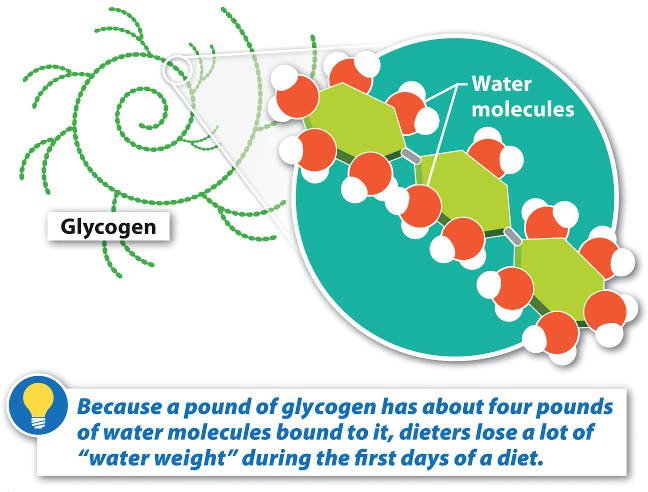
Image from insidetracker.com
You can also add in dietary electrolytes and potassium to replace those that you expel when insulin levels drop. When you don’t need as much insulin to absorb glucose from your blood, your levels go down, as a result, your body releases excess sodium and other electrolytes.
The most important thing you can do to reduce symptoms is to eat enough fat! For many people, the biggest hurdle to a well-formulated HFLC diet is their preconceptions.
Getting 70% of your calories from fat can feel extreme at first, but it’s important to give your body all of this powerful macronutrient that it needs. [35]
Vega Keto: The Outlook
A vegan keto diet revolves around plant-based foods like avocados, coconut milk, olive oil, nuts, seeds, tofu, and leafy greens. It’s entirely possible to go keto without consuming animal products. You just need to put extra planning into your food choices and supplement if necessary. Bon appetit!













